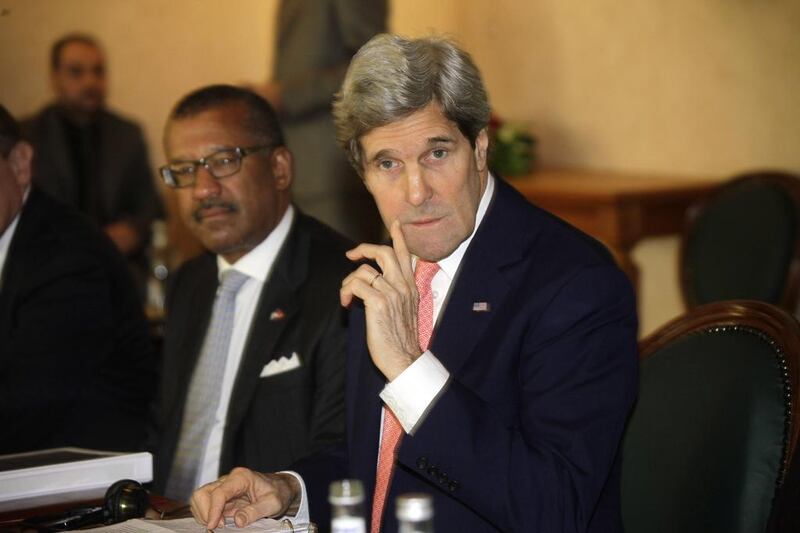CASABLANCA, MOROCCO // John Kerry said on Friday that it was time for a “reality check” in foundering Middle East peace talks and warned that the US would evaluate whether to continue to take part.
The increasingly frustrated US secretary of state, who has spent the better part of his 14-month tenure trying to cajole the parties into talks, stopped short of declaring the peace process dead.
Mr Kerry, however, made clear his patience with Israeli and Palestinian officials was near exhausted.
“It is regrettable that in the last few days both sides have taken steps that are not helpful and that’s evident to everybody,” he said. “This is not an open-ended effort, it never has been. It is reality check time, and we intend to evaluate precisely what the next steps will be.”
Mr Kerry said he would return to Washington to consult with the Obama administration on the next step.
Speaking to reporters in Rabat before travelling to Casablanca for a meeting with Morocco’s king, Mr Kerry said the Israeli-Palestinian peace talks could not continue to occupy so much of his time if the Israelis and Palestinians were unable to take even minor steps toward making the negotiations successful.
Mr Kerry has been the lead player in the administration’s effort to forge a long-elusive deal to end the conflict and for the past 12 days had been conducting furious shuttle diplomacy to salvage the talks as an April 29 deadline loomed.
With little, if any, tangible signs of progress over the course of eight months of talks, the initial goal of a comprehensive deal was scaled down to an outline of what such an agreement would look like.
If the talks do collapse, it would be a huge disappointment to Mr Kerry and could be seen as a foreign policy failure for the administration.
The Obama administration even took the unprecedented step of allowing the possible release of convicted American spy Jonathan Pollard, who is serving a life sentence for selling US military secrets to Israel, to be used as an inducement to get Israel to release some Palestinian prisoners.
Every president since Ronald Reagan has refused Israel’s request to release Pollard.
US officials said Mr Kerry had been blindsided by moves by Israeli and Palestinian leaders that affected the negotiations process.
The US top diplomat spoke to both Israeli and Palestinian leaders on Thursday in a desperate bid to bring the two sides back from the brink.
But Palestinian president Mahmud Abbas rejected Mr Kerry’s appeals to withdraw the applications he signed on Tuesday to adhere to 15 international treaties, a Palestinian official said on Friday.
Meanwhile, the Israeli prime minister, Benjamin Netanyahu, ignored appeals to refrain from “unhelpful” tit-for-tat moves and asked officials to draw up a range of tough reprisals.
Yesterday, the Israeli interior ministry announced that it had given the green light for a controversial visitor centre in an Arab neighbourhood of annexed East Jerusalem in what was widely seen as a retaliatory measure.
Israel says Tuesday’s move by Mr Abbas was a clear breach of the undertakings the Palestinians gave when the talks were relaunched last July to pursue no other avenues for recognition of their promised state.
The Palestinians say Israel had already reneged on its own commitments when it failed to release a fourth and final batch of veteran Arab prisoners as scheduled at the weekend, and that the treaty move was their response.
Both sides insisted they remain ready to talk and the Palestinian chief negotiator Saeb Erakat was to meet US envoy Martin Indyk later on Friday.
But as the steps and counter steps multiplied, the talks looked close to collapse as Mr Netanyahu has asked the head of the Israeli military administration in the occupied West Bank, General Yoav Mordechai, to draw up a range of tough options to punish the Palestinians, Haaretz newspaper reported.
The options under consideration include withholding tax revenues levied by Israel on behalf of the Palestinian Authority.
Israel briefly imposed the same financially crippling measure in December 2012 to punish the Palestinians’ successful drive for observer state status at the United Nations, over its own strong opposition and that of Washington.
Other options include tightening the restrictions imposed on Palestinian activities in the more than 60 per cent of the West Bank which is under the sole control of the Israeli army.
Tzipi Livni, the justice minister who is Israel’s chief negotiator in the peace talks, told the Palestinians on Thursday that there had been a chance of a belated release of the final batch of prisoners, who had been scheduled to be freed last weekend.
But she said it had been scuppered by the Palestinians’ treaty move.
Some 1,500 Palestinians demonstrated yesterday outside Ofer military prison near Ramallah, rallied by the families of those who were meant to be released March 29.
Eight protesters were wounded by gunfire from Israeli troops, medics said.
* With reporting by Associated Press, Agence France-Presse and Reuters





